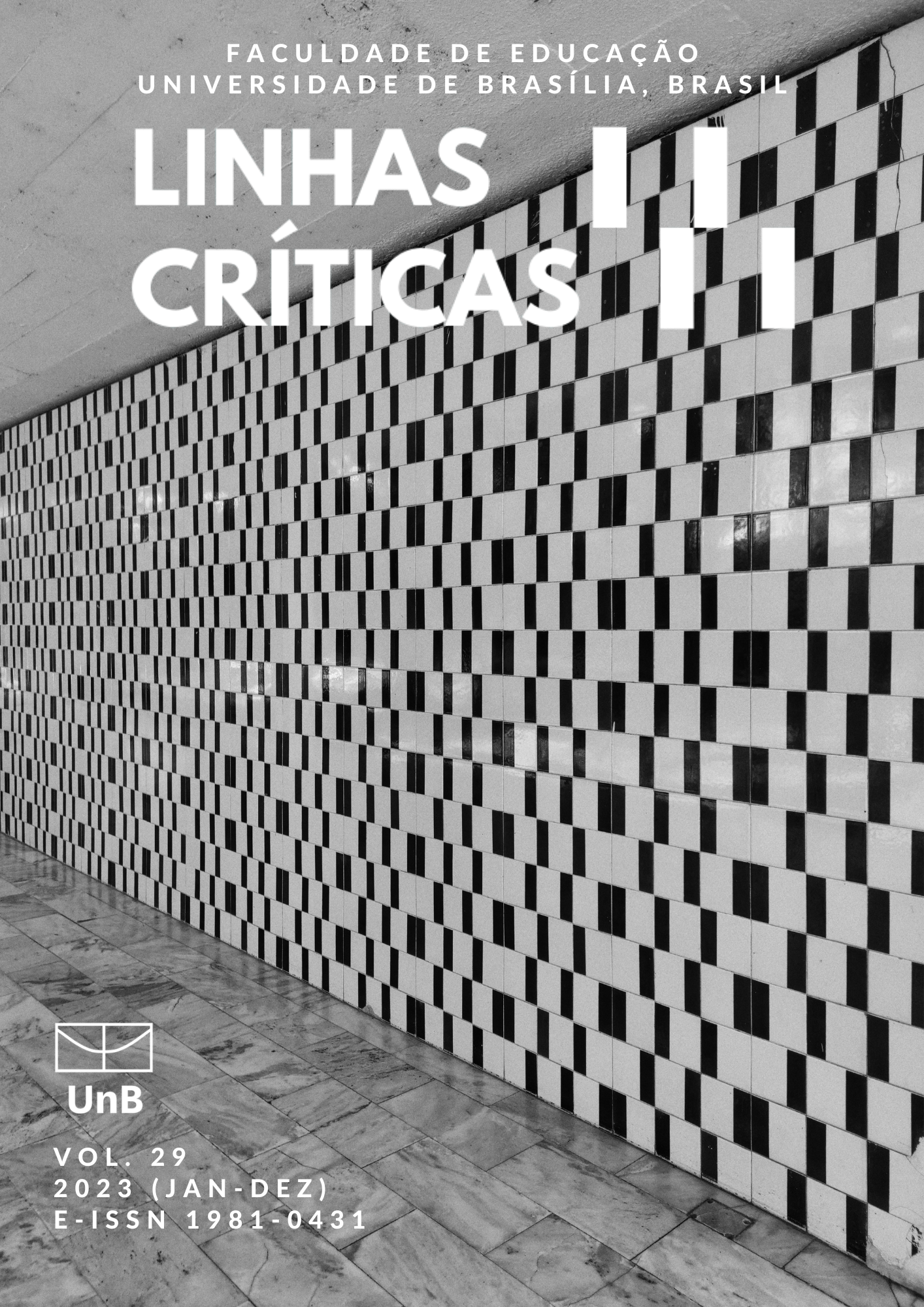Life history, lived temporal facts and adult education
DOI:
https://doi.org/10.26512/lc29202347892Keywords:
Comprehension, Cinetics of narratives, Lived temporal factsAbstract
The article is structured in four sections: the formalization of the stream of life stories in formation; the formalization of relationships between narrative regimes and narrative kinetics; the characterization of the processes of elucidation and understanding of subjects. Through this study, narrative theories and practices associated with them are questioned through a phenomenological and hermeneutic perspective and, subsequently, situated as a contemporary current in adult education.
Downloads
References
Breton, H. (2019). Vitalité des formations par les histoires de vie. Em M.-C. Bernard, G. Tschopp, & A. Slowik (dir.). Les voies du récit: pratiques biographiques en formation, intervention et recherche (p. 13-27). Éditions Science et bien commun.
Breton, H. (2022). L’enquête narrative en sciences humaines et sociales. Armand Colin.
Breton, H. (2023). Investigação narrativa em ciências humanas e sociais (tradução: Camila Aloisio Alves). Fundação Carlos Chagas. https://doi.org/10.18222/fcc-60876-16-7
Adam, M. (2015). Les textes: types et prototypes. Armand Colin.
Alhadeff-Jones, M. (2020). Explorer l’inconscient rythmique dans les pratiques d’histoires de vie en formation. Éducation Permanente, 222, 43-51. https://doi.org/10.3917/edpe.222.0043
Bakhtine, M. (2017). Esthétique de la création verbale. Gallimard.
Baroni, R. (2007). La tension narrative. Suspense, curiosité et surprise. Seuil.
Baudouin, J.-M. (2010). De l’épreuve autobiographique. Peter Lang.
Bégout, B. (2020). Le concept d’ambiance. Seuil.
Bourdieu, P. (1986). L'illusion biographique. Actes de la recherche en sciences sociales, 62-63, 69-72. https://doi.org/10.3406/arss.1986.2317
Bremond, C. (1966). La logique des possibles narratifs. Communications, 8, 60-76. https://doi.org/10.3406/comm.1966.1115
Bremond, C. (1973). Logique du récit. Seuil.
Cance, C., & Dubois, D. (2015). Dire notre expérience du sonore : nomination et référenciation. Langue française, 188, 15-32. https://doi.org/10.3917/lf.188.0015
Delory-Momberger, C. (2005). Histoire de vie et Recherche biographique en éducation. Economica.
Delory-Momberger, C. (2009). La condition biographique: Essais sur le récit de soi dans la modernité avancée. Téraëdre.
Delory-Momberger, C. (2019). Vocabulaire des histoires de vie et de la recherche biographique. Érès.
Depraz, N. (2012). Comprendre la phénoménologie. Une pratique concrète. Armand Colin.
Depraz, N. (2014a). Attention et vigilance. Presses universitaires de France.
Depraz, N. (2014b). Première, deuxième, troisième personne. Zeta Books.
Depraz, N. (2020). De la narration dans l’entretien micro-phénoménologique. Éducation permanente, 222, 23-30. https://doi.org/10.3917/edpe.222.0023
Dominicé, P. (2007). La formation biographique. L’Harmattan.
Dominicé, P., Gaulejac de, V., Jobert, G., & Pineau, G. (2000). Que faire des histoires de vie? Retour sur quinze ans de pratiques. Éducation permanente, 142, 217-240.
Esnault, N. (2019). Narration et éducation thérapeutique. Chemins de formation, HS2019, 15-29.
Fabre, M. (1994). Penser la formation. Presses universitaires de France.
Ferrarotti, F. (2013). Histoires et histoire de vie. Téraèdre.
Finger, M. (1984). Biographie et herméneutique. Les fondements épistémologiques et méthodologiques de la méthode biographique. Presses de l’université de Montreal.
Foucault, M. (1972). L’ordre du discours. Gallimard.
Gaulejac, V. (2012). L’histoire en héritage. Payot.
Josso, C. (1991). Cheminer vers soi. L’Âge d’Homme.
Lavocat, F. (2016). Fait et fiction. Seuil.
Matos-de-Souza, R. (2022). Notas para o trabalho com a hermenêutica na pesquisa em educação. Momento - Diálogos Em Educação, 31(03), 26-40. https://doi.org/10.14295/momento.v31i03.14038
Niewiadomski, C. (2012). Recherche biographique et clinique narrative. Érès.
Petitmengin, C. (2010). La dynamique préréfléchie de l’expérience vécue. Alter, 18, 165-182. https://doi.org/10.4000/alter.1668
Petitmengin, C., Bitbol, M., & Ollagnier-Beldame, M. (2015). Vers une science de l’expérience vécue. Intellectica, 2015/2, 64, 53-76. https://doi.org/10.3406/intel.2015.1012
Pineau, G. (1989). La formation expérientielle en auto-, éco- et coformation. Éducation permanente, 100-101, 23-31.
Pineau, G., & Legrand, J.-L. (2019). Les histoires de vie. Presses universitaires de France.
Pollak, M. (1990). L’expérience concentrationnaire. Essai sur le maintien de l’identité sociale. Éditions Métailié.
Ricœur, P. (1949). Philosophie de la volonté. Le volontaire et l’involontaire. Aubier.
Ricœur, P. (1983). Temps et récit. 1. L’intrigue et le récit historique. Seuil.
Ricœur, P. (1986). Du texte à l’action. Seuil.
Ricœur, P. 1985). Temps et récit. 3. Le temps raconté. Seuil.
Schütz, A. (1987). Le chercheur et le quotidien. Klincksieck.
Varela, F. J., & Shear, J. (1999). The view from within. First-person approaches to the study of consciousness. Imprit Academic.
Vermersch, P. (1994). L’entretien d’explicitation. ESF.
Vermersch, P. (2011). Explicitation et phénoménologie. Presses universitaires de France.
Villers, G. (2002). Souci et soin de soi: Liens et frontières entre histoire de vie, psychothérapie et psychanalyse. L’Harmattan.
Published
How to Cite
Issue
Section
License
Copyright (c) 2023 Herve Breton

This work is licensed under a Creative Commons Attribution 4.0 International License.
Authors who publish in this journal agree to the following terms:
-Authors maintains the copyright and grants the journal the right of first publication, the work being simultaneously licensed under the Creative Commons Attribution License which allows the sharing of the work with recognition of the authorship of the work and initial publication in this journal.
- Authors are authorized to enter into additional contracts separately, for non-exclusive distribution of the version of the work published in this journal (eg publish in institutional repository or as a book chapter), with acknowledgment of authorship and initial publication in this journal.
-Authorers are allowed and encouraged to publish and distribute their work online (eg in institutional repositories or on their personal page) at any point before or during the editorial process, as this can generate productive changes as well as increase the impact and the citation of published work (See The Effect of Free Access).



